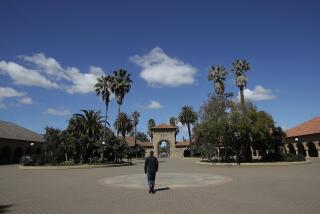Measuring Mentoring
A federal judge’s restraining order against Proposition 209, the state anti-affirmative action measure, has not affected plans to end such programs at University of California campuses. Educators are seeking new ways to keep the percentage of minority students at the top campuses from plummeting; one attractive concept is mentoring. There are no definitive studies of the benefits of mentoring, but people who have taken part come away believers that they produce enhanced achievement among both gifted and at-risk students. JIM BLAIR spoke with administrators, mentors and students at two very different programs.
A Hand Up to Talent
VIRGINIA HATHAWAY
Interim Director, Young Black Scholars program, Los Angeles
The Young Black Scholars program was founded in 1986, after reports showing low representation of minority students at the UC and California State systems, and its goal is to help promising students prepare for college. It is part of a unique partnership with the UCLA Community Outreach Program, the Los Angeles Unified School District and our founding sponsors, the 100 Black Men of Los Angeles, a civic nonprofit organization. We work with ninth- through 12th-grade students in Long Beach, Compton, Inglewood, Pasadena, Santa Monica and Malibu, as well as the Los Angeles school district.
I see the implications of [anti-affirmative action regulations at UC campuses] and the vote on Proposition 209 as additional incentives for the students, the mentors and the community to pull together. We just have to step up to the plate and continue to do our best.
Potential participants are recommended by administrators, teachers and counselors on the basis of at least a B-minus average in their eighth-grade academic requirements, outstanding student leadership qualities and community service.
The program features academic support--a series of workshops focusing on writing skills, math and science and preparation for nationally recognized standardized exams. Parent involvement and family support in academic achievement programs such as ours is critical.
We’ve depended primarily on an informal mentoring system. For example, an organization will adopt a high school and then match their members with the career, subject or hobby interests of the students. Exact matches aren’t always possible, however, and there can be more than one student for a mentor. We are experimenting with a much more structured program this year, underwritten by a corporation, that will involve about 10 students in one-to-one relationships.
We had 800 students in 1995-96. We’re still collecting data, but at this time at least 70% to 80% have indicated that they were headed to a university or a community college.
In some places, there has been peer pressure on young people not to go to college, but we’ve begun to see a reversal of that trend. The strengthening of role models and greater identification with individuals who are making a difference in the community are cause for hope. We have built a reserve of peer support groups--Young Black Scholar Clubs--throughout the various school districts. That tends to help reverse the perception that “we don’t need college.”
To get involved: (310) 794-0554
More to Read
Sign up for Essential California
The most important California stories and recommendations in your inbox every morning.
You may occasionally receive promotional content from the Los Angeles Times.










